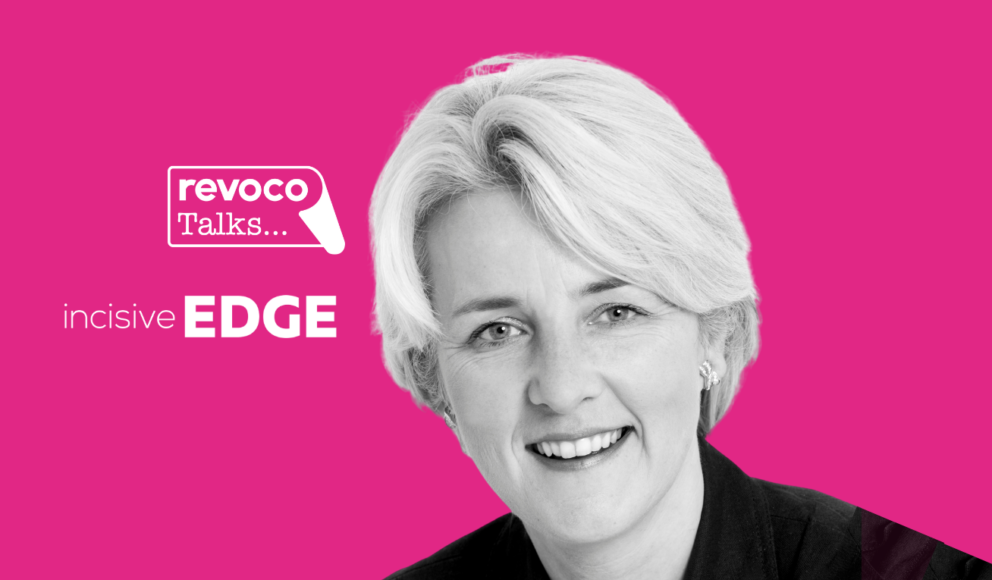Written by:
Christine Christodoulou
Revoco talks…the importance of marketing for start-ups with Julia Payne
We’re delighted to have been joined by Julia Payne for this Revoco Talks instalment. Julia is Managing Director and Chief Strategist at Incisive Edge. Incisive Edge is a growth marketing strategy, specialising in start-ups.
Here she provides insight on the importance of allocating marketing spend in start-up phase and some of the challenges start-ups face when trying to translate their proposition through marketing. Have a read below…
Julia, thanks for joining us! Could you tell us more about your career background?
A rather unusual background!
I started my career as a litigation lawyer and although I enjoyed it enormously – because life in litigation is hugely varied, I had an epiphany one hot sunny day as I climbed the underground steps at Victoria, thinking, do I want to be doing this for the rest of my life – getting in the same train carriage, with the same people and in essence, doing the same thing each day?
The thought process was really brought about because I had been offered partnership – so there was no putting it off, a decision had to be made. And I had another option.
That option was to start up a company in marine hospitality. Rather eclectic I know, but my husband was a sailor and we could see an opportunity to bring ‘corporate’ hospitality to the marine industry, which at the time was quite cottage industry.
So that was the decision I made – to leave law and start up a company. The irony is, Incisive Edge is now based at Victoria!
Anyway, we started up and in 9 months we were bought out by a large sailing company. I joined the board and was part of the management team that floated the company from OFEX to AIM.
Not long after, we started up a related sister company specialising in putting wireless comms into super yachts – that shows how long ago it was! We floated the company onto AIM and it’s still going strong today, although it has pivoted over the years to become a more disruptive telecoms company.
Long story short, my reputation was then being built in growing companies and I was approached by a global leadership consultancy who was looking to scale. I joined them, became CEO and within 5 years from joining, we sold to a US consultancy.
Interestingly, it was all organic growth, so it really honed my skills on what works and what doesn’t.
After the sale, I met my business partner, David Bowler and that’s when Incisive Edge was born.
Can you tell us more about Incisive Edge and the work you do?
Incisive Edge is a growth marketing agency.
We specialise in working with tech companies who want to scale.
We started by working with UK tech companies, but have now expanded globally, with the US and LatAm being our main overseas markets.
Our specialism really goes a step further, because we major in creating integrated programmes, driving revenue, results and ROI cross channel – working to meet the company’s objectives, KPIs and metrics. We’re all about analysis, data and continually improving performance through marginal gains.
We work with startups, scaleups and enterprise, with the predominance of our work being startups through to post Series A. Whilst there are many inflexion points on the growth journey, typically the majority of those inflexion points are between those specific stages. Companies are finding their feet, understanding what works and what doesn’t, where to spend their budgets and often pivoting. It’s safe to say there’s a lot going on and it’s very easy to burn through your marketing/ sales budget without really achieving anything so we are laser-focused on driving those metrics.
We recently did a Q&A with James Church (COO @ Robot Mascot). He spoke about how after a lack of access to capital, not being able to effectively sell and market your product is the second biggest killer of start-ups. When it comes to marketing – what are they key things start-ups shouldn’t forget?
I think that’s very true.
There’s a few things that should be on the horizon of every startup and also for a scaleup if they are plateauing.
Firstly, remember, nobody is interested in your tech platform apart from you. I spend my life saying that to founders.
Prospects are only interested in the what’s in it for me?
You can have the world’s best platform, but if you can’t say why you are different, if you’re not clear on your target markets and buyer personas and you lack clarity on how your tech will meet the needs, pain points and challenges of your buyer personas, then you are simply not going to succeed.
The days of waffle, jargon and we’re good, but they no longer exist. You have to appeal to your audience for where they are in their own buying and decision-making journey.
Which brings me onto the second point. Marketing is about communicating and engaging your audience for where they are in their journey – not yours.
Of course, we all wish that our prospects were ready to buy when they hit our site or app, but the reality is, there is usually only between 3 – 5% of your entire target audience that is in-market – i.e. ready to buy. A message that appeals to someone at the bottom of the funnel – when they’re in buying mode – is highly unlikely to appeal to someone who is just starting their buying journey at the top of the funnel.
One size does not fit all when it comes to your messaging.
At the top of the funnel it’s all about information and education. At the bottom, it’s about hard facts and figures. The two are very different however, they are, more often than not, treated the same. Differentiating your messaging and comms is crucial.
And you messaging should underpin your value proposition.
A value proposition should showcase the value you deliver, to whom, stating why you are different. As a startup, it’s essential that you say what you do on the tin, front and centre. The above the fold area on your home page is more often than not, the place for your value proposition.
All too often though, that valuable real estate is used for some marketing strapline that sounds good, but simply does not say what the startup does.
If a prospect can’t see what you offer and the value you deliver within the first 7 seconds of hitting your site, you can be sure they’re not going to be searching for it. They will just leave your site and go to one of your competitors.
What do you think are the startup killers?
To be honest, there are many but here are two key killers.
1. Spending all your budget on brand and not having anything left for marketing or sales.
You can have the best brand in the world, the sexiest site or app, but if you cannot market it due to lack of funds, then it’s nothing more than an expensive folly.
Every startup has to bootstrap, so begin with the essentials – your buyer personas, value prop, competitor analysis, positioning, messaging, strategy etc – and build from there. Don’t start with the brand to rival Apple and then realise you have no money left for lead generation.
2. Give serious consideration within your marketing strategy and budget as to the split between organic and paid marketing.
Paid marketing is great and is super useful for testing. It can also provide immediacy of results, but only if you have everything in place. Starting paid, when you are not clear on your difference or your target audience for example, is a waste of budget.
Organic is a slower, more foundational approach. It’s not sexy and it requires both consistency in approach and to be honest, hard work. However, done correctly, it will continue to drive revenue, results and ROI for many months or even years.
Whilst there are always exceptions, typically your marketing strategy should be a blend of both organic and paid, but think about the ratios in which each is applied.
In the early stages of business, startup founders must develop effective strategies to establish market share, achieve results and ultimately turn a profit >> https://t.co/jWG12FNxHH #startups #startup #tech #founder #growth #marketing
— Incisive Edge (@incisiveedge) June 26, 2020
Have you noticed a shift in the way your start-up clients have approached marketing in the face of the pandemic?
The pandemic has left no-one untouched, that’s for sure. We have all had to adapt in some form or other, but our clients have done exactly that – they have adapted, been flexible in their approach and in many cases doubled-down.
Whilst it’s easy to trot out lines such as great companies are born in recessions – and of course they are – the day to day reality we all face makes that difficult to see sometimes. However, our clients are determined and we have worked in partnership with them to really drive results.
What makes our clients great leaders and entrepreneurs is that they are open to change, to feed in their ideas and to take the rough with the smooth. We really are very fortunate.
What are the challenges founders face when it comes to marketing and sales in start-up phase?
There is so much information available and so many changes to existing marketing channels, with new ones seemingly appearing every day, that it can be overwhelming – a complete overload. How does a startup founder know where to begin? This is a primary challenge.
However, the rules remain the same as ever.
Start with the basics as outlined above. Who are you targeting, with what message, for what stage of their buying journey? What is your competitive advantage? What is your value proposition? Do the basics better than your competitors and you’re on the road to success.
If you don’t do them at the beginning of your journey, the reality is, in order to scale, you’re going to have to do them at some point and then it becomes much more of a feat as you’re into wholescale changes with your website, collateral, integrations etc.
Our mantra. Do it once and do it properly.
Are you a start-up or scale-up looking to get serious about your growth marketing strategy? Find out more about how Incisive Edge can help you here.
We’re saving start-ups time and money. Find out how here.


